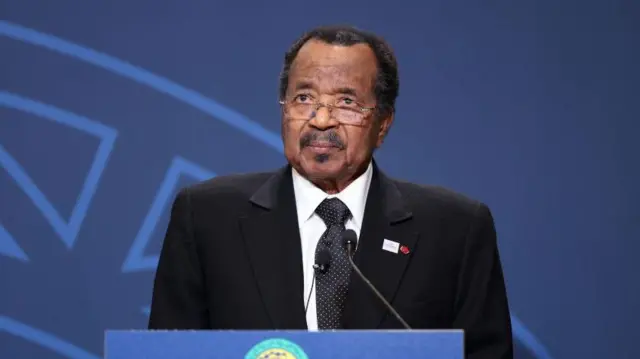
As Cameroon navigates its 2025 presidential election, the nation is confronting a new and alarming reality—one where artificial intelligence (AI) tools have been weaponized to manipulate public opinion and distort the electoral process.
The emergence of AI-generated disinformation marks a dramatic shift in how political campaigns are conducted, amplifying concerns about the integrity of the democratic process.
During the lead-up to the October 12 election, AI-powered technologies such as deepfakes and photo manipulation were increasingly employed by political campaigns, creating an atmosphere of uncertainty and skepticism.
Previously isolated incidents of digital manipulation have now become widespread, with several political factions resorting to these advanced tactics to sway public sentiment.
Among the most significant examples was the circulation of doctored photos depicting opposition candidate Joshua Osih in front of artificially enlarged crowds at a rally in Yagoua.
Cameroonian journalist Annie Payep revealed that she had received these altered images via WhatsApp. Despite the Social Democratic Front (SDF)—Osih’s political party—denouncing the images as fraudulent, numerous witnesses confirmed the photos’ existence before they were quickly deleted.
In another notable instance, the spokesperson for rival candidate Hiram Iyodi publicly defended the use of AI-generated images, stating on social media that she would “not apologize for living in the times.”
This marked a troubling public acknowledgment of AI manipulation as a campaign tool, normalizing its use in political discourse.
But the digital misinformation didn’t end with doctored photos.
The country’s electoral register became a fertile ground for controversy. Citizens began reporting irregularities, including duplicate names and registrations of deceased individuals, further fueling suspicions of electoral manipulation.
One notable case involved a woman named Elemva Mbilli, who was found to have multiple registrations under different variations of her name.
While Elections Cameroon (Elecam), the body overseeing the election, dismissed these claims as disinformation, their refusal to release the complete national electoral list only deepened the public’s mistrust.
The spread of disinformation is not unique to Cameroon.
A global study by the International Panel on the Information Environment showed that 80% of countries in the 2024 elections faced disruption from AI-related incidents.
Cameroon is no exception, with AI tools increasingly capable of generating convincing fake videos, articles, and images, making it difficult for the average voter to discern fact from fiction.
Fred Eboko, a political scientist, explained that these manipulated images are designed to create an illusion of popular support for certain candidates, especially for opposition figures trying to challenge the long-standing dominance of President Paul Biya.
At 92 years old, Biya remains the clear frontrunner in the election, and his campaign apparatus has been accused of utilizing the power of state resources to suppress opposition movements.
Yet, despite the increasingly sophisticated disinformation campaigns, many young Cameroonians are proving resilient. A growing segment of the electorate, particularly internet-savvy youth, has quickly recognized and mocked the doctored content on social media, further eroding the credibility of the manipulated images.
However, this vigilance from the youth has not calmed the fears of experts. Professor Destiny Tchehouali, an AI specialist at the University of Quebec in Montreal, expressed concern over the long-term implications of AI on political life.
He warned that as AI tools become more sophisticated, today’s crude deepfakes could give way to nearly undetectable manipulations in the near future, further undermining public trust in democratic processes.
In an attempt to combat the spread of fake news, Elecam has implemented an internal fact-checking system and a Facebook page dedicated to verifying election-related content.
Additionally, training sessions on identifying disinformation have been organized for journalists and civil society members, with support from organizations like Defyhatenow.
However, experts argue that while Cameroon has laws to penalize disinformation when it amounts to hate speech, these laws are rarely enforced due to the lack of resources needed to trace the source of manipulated content.
More troubling is the legal vacuum surrounding AI-generated images that merely distort reality rather than fabricate outright lies.
Adding to the complexity is the international dimension of disinformation in Cameroon. The Russian-backed news outlet Afrique Média, which promotes anti-Western narratives, has supported Biya’s extended rule and further complicated the fight against digital manipulation. Cameroon has increasingly become a battleground for pro-Russian propaganda, making the fight against disinformation even more challenging.
As the country awaits official election results, the climate of mistrust continues to grow.
Partial results placing opposition candidate Issa Tchiroma Bakary in the lead have sparked protests in Yaoundé, with demonstrators chanting, “Goodbye Paul Biya, Tchiroma is coming!” In a particularly brazen move, the logo of RFI, a prominent international news organization, was even falsified to lend credibility to this claim.
In a country long plagued by accusations of electoral fraud, the rise of AI-powered disinformation has further undermined the integrity of the democratic process.
As Cameroon grapples with the fallout from this historic election, the world watches closely to see how the nation will address the challenges posed by artificial intelligence in the political arena.



